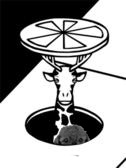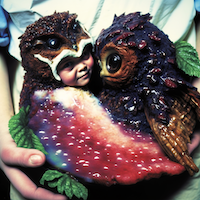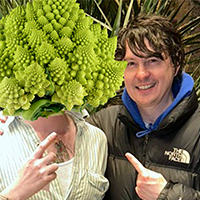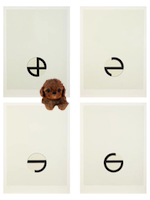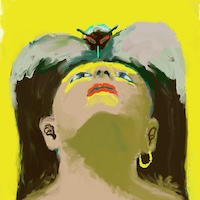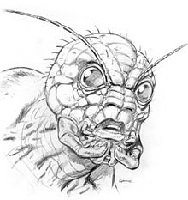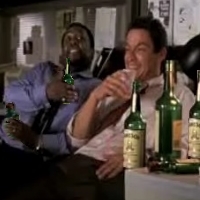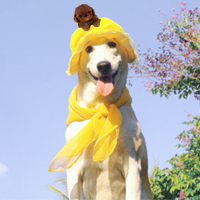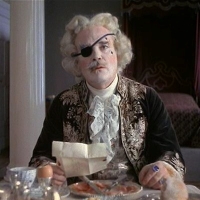"Who Could Win a Rabbit"
David Garland: "Who Could Win a Rabbit"—that's the title of the song we just heard. It's by Animal Collective. You may have heard it on Spinning on Air before. We're hearing it in a different context tonight. The context is that several members of Animal Collective are here with me. I'm David Garland. This is Spinning on Air, here on WNYC. We investigate the meeting points of art and pop, and there's a strange point at which they meet in the world of the Animal Collective. And I have with me Avey Tare, Deakin, and Geologist, from the band. Welcome.
BW: Thank you.
JD: Thanks.
DP: Thanks for having us.
DG: Is there only one of you missing, is that the case?
DP: Panda Bear--
DG: Panda Bear--
DP: He's in Porttugal
DG: Where he lives now, isn't it?
DP: Uh-huh.
DG: And Animal Collective, how long have you guys been together?
DP: I guess it depends on what you classify as being together. I guess we've known each other for about ten years.
BW: Some of us longer.
JD: In some cases longer, yeah.
DG: You're in your twenties now, you said?
DP: Mm-hm, mid-twenties—
BW: Twenty-five, yeah.
JD: Twenty-six.
DP: But we've been playing with the word "Animal," you know, in some form or another since '99, I guess, basically. It started off as the name of our label, actually, that we put Spirit They're Gone, Spirit They've Vanished out under and from there it sort of became a band name.
DG: Was the label "Animal Collective?"
DP: No, it was just "Animal." "Animal Collective" actually formed out of necessity, actually, other than just desiring a band name because we never really, you know, have thought of ourselves as like a band proper. We sort of just think of each other as friends that sort of share music with each other I guess because we grew up that way, and at a certain point, I guess, we were all playing together in New York, in around 2001, 2002 and went on our second tour of the U.S. and, you know, originally we had just sort of planned on just naming each project, you know, the name of the what the project would be, like "Avey Tare and Panda Bear" or "Avey Tare, Panda Bear, and Geologist"—those were sort of the two forms that we had when we first started playing in New York, and then we went on tour as a four-piece, and I guess it just got to be a little complicated to list things as "Avey Tare, Panda Bear, Geologist, and Conrad Deakin."
BW: You can't write it on a poster and make it look attractive.
DP: So I think it was just sort of like, well, uh, how can we do this and have it be some sort of, like, a recognizable title that people are just gonna latch on to. Which was kinda hard for us at the time because a lot of people knew us, kind of, as Avey Tare and Panda Bear at that time, because all the shows that we'd played were listed as that, and we had Spirit They're Gone, Spirit They've Vanished out, and that was out as "Avey Tare and Panda Bear." So a lot of people recognized, this is a band called that. But then we sort of made the switch to "Animal Collective"—and I actually thought it was gonna be a lot more complicated then it actually turned out to be, but it's worked out alright.
BW: Avey's brother thinks he plays in two bands, one's called "Animal Collective," the other's called "Avey Tare and Panda Bear."
DG: Uh-huh. [laughs] Well, it seems like "Animal Collective" is, uh—you're deliberately leaving definitions open there, not only with the music itself, but even as a band, because the latest Animal Collective album, from which we just heard that track, is called Sung Tongs and it's credited to Animal Collective, but I understand basically two of you made it.
DP: Right, just Panda Bear and I. Um, it's just like I said before, just sort of like an easier way for people to—I guess if all of our albums were titled, you know, differently, under different artists, it would sort of be cool, you know, to be kind of the confusing factor, is always nice, but at the same time it's good to be able to have people easily locate your music if you want them to hear it, you know?
DG: I'm speaking now, just now, with Avey Tare from Animal Collective. With us is Deakin and Geologist, also from the band. I want to get back to some of the details of your work together up to this point, but when I listen to your music, even the first music that I heard, which was a little more, sort of, like rock music in that it was more identifiably involving drums and electric guitars and stuff, the proportions of everything were really strange in the mix, and the idea of weird proportions and distortion of normal sensibilities is something that seems to be really important to you guys. It's the sort of world you're working in. And it made me want to go to the dictionary and look up the word "grotesque." Because, really, it kind of applies to what you're doing. Of course, generally, it sounds very pejorative—if you say something's grotesque, it kinda means, you know, ugly and unpleasant. But it doesn't necessarily mean that. Here's the definition of "grotesque" used as a noun: "a piece of decorative art characterized by fanciful or fantastic human and animal forms often interwoven with foliage or similar figures that may distort the natural into absurdity, ugliness, or caricature."
JD: I think that's how I'm gonna start describing us.
BW: We finally have an answer to that question.
JD: Thank you, David Garland.
[laughter]
DG: And it's interesting, too, because—this is just incidental—I never realized "grotesque" as a word derives from "grotto" and it's from cave paintings. And when "grotesque" is used as an adjective, the dictionary goes on, it means "of, relating to, or having the characteristics of grotesque, as fanciful, bizarre, absurdly incongruous, departing markedly from the natural, the expected, or the typical.
DP: Definitely.
DG: So you guys are all comfortable with those?
BW: Yeah, that's sweet.
JD: Yeah.
DG: That does seem to be the sort of aesthetic place you wanna be.
DP: I don't think—it's not always, like, an outright decision, you know, it's not always something that's talked about—
DG: No, I assume not.
DP: Yeah, it's sort of a filter, I think. We have a natural filter—everything just runs through it when we get together to play. We could even come together and say, "oh, we're gonna make a song, you know, that might sound like this," or "let's try it this way," but it usually just ends up when we just start playing, you know, things just go through this sort of Animal filter and things turn out a little off—
JD: Grotesque.
DP: Grotesque, I guess.
BW: We played for so long with each other before this current incarnation of Animal Collective or whatever came together, I mean, you know, like '99, and we'd been playing, learning our instruments with each other for the five years before that, and I think it just sort of develops. I mean thankfully we had that time period in high school or whatever to develop a filter for ourselves without it being intentional, just sort of happens, so by the time we were ready to present our music to other people it was already there for us to use.
DG: Yeah, no, I get the impression that you're not sort of sitting down and thinking "let's make some grotesque music," but that's kind of where your heads are, in a way. Let's hear a little more from the latest album, Sung Tongs. I'm with Animal Collective here, and maybe we should hear the first track from the album. The album is very, seems to me, very carefully put-together, and yet spontaneous. Sometimes, somehow it hits both things.
DP: I think all of our music, in general, sort of has that quality to it, because there's a side of living and just sort of playing music, it sort of all ties together, that we like to be spontaneous and sort of off-the-cuff in terms of moods and just how we're effected by our surroundings, you know, at an immediate certain time. But at the same time, everything's written, all the time, that we do, and so it has this very thought-out side of it. And all the songs were sort of intentionally placed, and there were songs we actually wanted to record for the album that we didn't end up getting to record, but we sort of just left them out on purpose because we wanted the album to be diverse enough but still have a cohesive feeling. But yeah, when we're playing songs it's sort of like there is a spontaneous side to it, because it's usually the mood is never gonna be the same, you know, each time we play it.
DG: "Who Could Win a Rabbit," the track we heard opening, has a really disconcerting quality to me because it's played with such exuberance, and it's really like, "come on, everybody! sing!" and there are multiple voices, it's like everyone's joining in, and yet the rhythms are all askew, and it's next to impossible to join in and actually coordinate.
DP: I don't know, yeah, see, stuff like that, I don't know how intentional that is all the time, although the off sort of feeling is good, too, the skewed vision of it all, that just sort of happens. But yeah, the "come on everybody, let's sing," I think that's sort of our attitude in general about playing.
BW: Yeah, has been for a while.
DP: Yeah, we just sort of, you know, wanna get people involved and excited about making music and playing music because we've felt for a while that there wasn't a lot of music that was exciting to us, or like really just trying to be energetic and more about energy, and so it's very important us to have that, sort of.
DG: Well now you make me want to hear the track, I think it's called "Kids on Holiday," because that's, like, "come on, kids! join in!" and we hear some kids voices eventually in the track. So let's hear that, by Animal Collective, here on Spinning on Air on WNYC.
"Kids on Holiday"
"Leaf House"
DG: That's Animal Collective. We heard two tracks from the album Sung Tongs, which is new. We heard "Kids on Holiday" and "Leaf House," and three of the four members of Animal Collective are here with me. Sitting around the WNYC table here are Avey Tare, Deakin, and Geologist. I'm David Garland, this is Spinning on Air, and coming up a little later we will have some live recordings by Animal Collective. They have culled their archives, their multi-MiniDisc archives of live recordings, and selected a few favorites that they're sharing with us, some unreleased live recordings that you'll hear tonight here on Spinning on Air.
DG: Now, you guys mentioned that you grew up together. Where was that?
DP: Baltimore County, Maryland.
DG: Uh-huh. Suburbs, sort of?
DP: Yeah, sort of like twenty minutes north of the city.
JD: Rural suburbs.
DG: And was there anything, do you think, in the environment in which you grew up that sort of led you in the direction you're going?
DP: Definitely.
JD: Our lives.
BW: We used to hang out a lot outside.
DP: I think, basically, our high school experience—at least Brian and I's high school experience, like...
DG: Kind of the experience you made for one another, you mean, or...?
DP: Or just what we did most of the time involved hanging out on our friends' back porch, you know, usually, which was—or like on any of ours' back porches, or something like that, it was just like "what are we gonna do this weekend," we didn't really, like, hang out with a lot of people at our school that partied and stuff like that. We just, you know, sort of liked to sit around and listen to music, basically.
DG: So you would make musical discoveries, share them with one another.
DP: Basically, yeah.
BW: Always on back porches. Back porches, I think, were very key in high school.
DP: And we were all playing music at that time, not in Animal Collective, but that's sort of the other thing we did starting in, like, eleventh grade, you know, in high school.
BW: Tenth grade. The three of us.
JD: Noah was going to high school in Pennsylvania, he was boarding, and he was usuallyonly coming back on the weekends, and we'd usually hang out, like him and I, and then sometimes like three or four of us, but, like, it was kind of like that was usually what we would do, like'd he come back like on a Friday night or a Saturday and it'd be like getting together Saturday or Sunday just to, like, record something or, like, work on music. Like, it was kinda like kinda what we did when we had time to, like, spend together, so it was sort of, like, the most common communication between us, I suppose.
DG: And were you creating your own music, you weren't, ilke, doing covers of...?
JD: At least for the most part.
DP: Brian and I's band started doing covers, actually.
BW: Yeah, just to, like, sort of learn our instruments though.
DP: Yeah, 'cause I didn't, when we started playing, I had never—I guess either of us—he had played guitar a little bit longer than I did–
BW: A little bit, yeah.
DP: But I'd just started to play guitar, and so we both shared the love of Pavement—the band—so we decided to, you know, cover a bunch of Pavement songs.
BW: But we didn't go around performing them, or putting out, like, tapes of cover songs. We recorded them, I mean performed them, once at like a high school talent show kind of thing. People had no idea what they were hearing.
DP: I think one thing that really helped us sort of come into our own, I think, was sort of just, like, our initial interest in recording our own music, because right from the beginning that's just sort of how we went about, like, making our own music, you know, it was just sort of like—I guess it may be because of the music that we liked, or just because we happened to have the equipment available, it was just sort like oh, well we have kind of make songs on our own, you know, so we kind of record them on our own and then just share them with each other, you know. And it was just sort of, like, within our group of friends that we would give each other ideas or critique each other and be like "oh, you know, this is good, we should try this, or this," so we sort of grew together doing that, too, and so it helped a lot, actually. Just being able to record all of our own stuff.
DG: Can you look back now and see that you use, I don't know what, some of the aesthetics that were developed at that time?
DP: I think it's changed a lot, aesthetically, but I, personally, definitely learned a lot about how you record records, how you produce things, and, you know, I'd listen to—definitely listening to a lot of stuff and, you know, experimenting with how can I get stuff to sound like that, or how do they do that. I would read a lot about how—I guess I read a lot, was interested a lot in how, like, you know, like late-sixties, sort of, recording, you know, happened, 'cause it was all done in, like, simpler terms, you know, but it was definitely the first time, like, that things started getting freaky, I guess, in terms of pop music, you know, with like early Pink Floyd, and stuff like that, and those were sort of the producers that I really admired at that time, so that's the sort of stuff I was looking into.
BW: I mean, our aesthetic has changed—back in those days, when we were into more indie-rock kind of stuff, and then started getting into sort of late-sixties, you know, psych music, but I still think you can follow a direct link all the way back to, you know, us being fourteen or fifteen years old, like all the way, the steps, all the way to the kind of music we make now.
DG: That was Geologist speaking. Before we were listening to Avey Tare. Both members of Animal Collective. And Avey, you mentioned that the material, at least for Sung Tongs, the material we were listening to, is both sort of—you want it to sound spontaneous, but it's written out. Are you using actual conventional music notation, or some other kind of notation?
DP: No, it's basically all from our heads, you know. I was classically trained in music, like fifteen-and-a-half years worth of piano and classical music, but I really couldn't notate, like, you know, music too well.
DG: You couldn't, or you don't want to?
DP: I think both, I think, yeah, I kind of don't want to, either. I think anytime you're too studied in any form of music, I think it tends to push you, and you sort of get more boxed in terms of what you think you have to do. I think it was definitely, for us, more about breaking free from that. Breaking free from our initial learnings of music and learning, you know, traditional classical music, or both sides of it, just moving on to more of like an improvisational way of playing and having that sort of inform us rather than having everything pre-planned so much.
DG: I would guess the members of Animal Collective to not want to be boxed in, that's kind of clear from all your recordings. Let's hear something that's a little bit earlier than anything we've heard yet. The track we're going to listen to is called "Bat You'll Fly," and when was this recorded?
DP: '99. 1999, it was just a lot of songs I had written in college and it was the first time I was like, oh, you know, I kinda wanna put together a whole, like, cohesive group of songs that could be viewed as one album, because up until then it had just sort of been... we'd put out a solo record by Noah—Josh more than any of us—but he really pushed Noah, like, you know, along in doing that, but that was sort of more like a random collection of Noah's songs. Because we'd always been recording and recording lots of songs, but with Spirit They're Gone it was like the first time I was like, oh, I wanna do like a whole new group of songs that all sort of, like, group, you know, can be heard as one cohesive piece. So this is actually the first thing I recorded for it, sort of like a tribute to my sister graduating from high school.
DG: In what way? How?
DP: Oh, "bat you'll fly," just sort of just, like, "go for it." It was a gift for her, actually. I didn't intend for it to be on the record but when I recorded it, you know, I played it for these guys and they were like "man, that song's good, like..."
DG: So did the other guys participate on it, or is this is more or less a solo recording for you?
DP: The songs, more or less, are written and arranged by me, but Noah, like, did a lot of the drum arrangements 'cause he knows the most about rhythm and is, like, you know, a genius, as far as I'm concerned, in terms of that, and so it was more about, you know, we recorded it all in my parents' house and he would just come over every day. I think I owe all the drum parts to him 'cause it would have never sounded like that without him.
DG: That's Avey Tare speaking. Let's listen to the piece "Bat You'll Fly" by Animal Collective.
"Bat You'll Fly"
DG: That's "Bat You'll Fly" by Animal Collective, a relatively early recording in their project from 1999, though as you guys have described your project goes back to when you were sort of fourteen or fifteen or so, so it's been a long time. I remember when I first heard that song I was sort of dismayed and intrigued by the kind of push and pull that it offers the listener, you know, in a way it's kind of pretty and upbeat but you've got a real kind of strident high-frequency thing happening in the keyboard in the early part, and there are some guitar and bass lines that are pulled down in the mix so as to almost hardly be there, so everything's a little disproportionate in a way that I find intriguing but surprising as well. And there's kind of an effusive quality to that song that, as there is to most of your stuff, so it's kind of like out-there and singing, and yet there are hidden aspects to it as well, the words aren't all that clear, and there's even a little moment that made me smile toward the end there where you're repeating a phrase and it was hard to discern what it was, but you sort of emphasized "and you say..." or something like that and then your voice pulled down again, so it was like "and you say... [mumbles]..." There's this kind of sharing of information and there's withheld information as well.
DP: Yeah, well, I think it's sort of, there's like a humorous, sort of, like, surreal aspect to it, and there's a very honest, sort of truthful aspect to it, you know. I think a lot of, at least as far as the lyrics I write, I think a lot of them have to do what's going on in my life at the time. Like I was saying, most of that is about, you know, just me writing graduation words to my sister and turning it into this sort of surreal storyline, but at the same time there's sort of a more playful, like, aspect to it, like to me that refrain at the end could be, like, mixed and played in this certain way could be, like, overtly cheesy, kinda, or—not cliché, but it's sort of like a common, a repetitive rock thing, so it's sort of like, well, if I bury the lyrics in it, or the vocals to me are just more of an instrument, you know—especially at that time, 'cause I wasn't, like, as comfortable with my singing—so to me it was more, like, well, how could I just make the vocals be an instrument, you know, or be more of a texture. It was more important to do that, so everything is just this one cohesive piece. And then, like, you know, the lyrics "I feel so exclusive in Houston / You feel so reclusive..." you know, what, I'm not sure—it's sort of just like, oh, what does that mean, oh, it doesn't mean anything, it's kind of like...
DG: Does it mean nothing to you?
DP: No, it's just sort of like a playful way of putting words together so it's not this cheesy, like, dramatic, like, where I could be like [singing] "I... love... you..." you know what I mean, I don't know. It's just sort of just like, yeah, makes it a little bit more surreal, and I think that music that has mystery to it, like, is the most interesting to me, so you can (?)—you know, the bands I liked a lot when I was growing up were bands where you couldn't always understand the lyrics, so it was sort of like you think there's this sort of, like, hidden meaning in everything, or something like that, so it makes you more intrigued. Something that's not something you just latch onto the first time you listen to it. I think that's the most special kind of stuff. So that sort of has a lot to do with what we're doing.
DG: I agree with you that music or other art forms that have an element of mystery to them are the most rewarding, the most interesting, and why do you think that is? I mean, you say it draws you in, but why are we drawn in, what is the magic that the mystery has?
DP: Well, I think, like, the musical listening experience for us, sort of, has always been this—like, even listening has been this sort of playful experience, you know. Brian and I used to just—well, when we first moved to New York, you know, we just hung out with each other, we didn't know anybody else.
BW: We didn't have any friends...
DP: We moved here to go to college, and so our time was spent, like, daily we would go around and buy tons and tons of records, 'cause here we were in this amazing city where, you know, all the records we have ever dreamed of, like, being able to find were at our fingertips, you know. And so at night, basically, or on the weekends we would just get together and, like, be like "check this out," you know, like, "this is crazy," you know, and for us it was more like the music created, sort of, like a sound world for us, you know what I mean, it was something we could joke around about and be like "oh, that sounds like robots walking down a hallway, you know, or like a vampire, like, coming out." That's what we liked about listening to music.
DG: That it would evoke imagery.
DP: Yeah, and I guess that's sort of what we want to do with our music. It's more important to create an environment with it for us than, you know, just being able to provide a catchy tune that people just want to listen to over and over—which is an important side of it too, we're into melodies, and I've always been into songwriting, but, you know, it's an old art form, sorta, in a way, so how can we do something new with it? Not that we're the first band ever have this idea of, like, songs as an environment, but I think it was definitely something that we wanted to try out right off the bat.
DG: And so you think this sense of mystery adds to the sense of environment that the song can give you.
DP: Yeah, it's sort of like a big hobby of ours, and still, you know, of ours—I try and do it as much as I can—is, like, trying to go to places like abandoned buildings, or we used to go to this—we talk about it a lot, actually—we used to go this run-down nursing home. When we were in high school we just found this right off this really main, like, suburban strip with all these fast-food restaurants on it, we found this, like, decayed nursing home that had this really, really old part to it, and then this sort of more modern, like, hospital wing-looking part, and we'd go there in the middle of the night, it was just completely abandoned, and everything that had been there when it was in working order was still there, but just, it was in complete disorder. Like, the hospital beds were all turned over, the file cabinets were turned over everywhere, there was curtains and dust, and...
BW: There had been a fire in the eighties sometime, and people left and never went back, and it wasn't even boarded up, and you could just walk in the door, and everything was just how, like, around that fire, like, everything was just left like that.
DP: And I guess you just go into a place like that, wanting or hoping that, like, something is actually gonna, like, really freak you out, maybe, in there, even though maybe, deep down, you don't wanna, like, be hurt or anything like that, but you sort of go in because there's a mystery to it, because there might be ghosts, or you know what i mean, and so that element can be seen in our music. It's just sort of, like, what's around the next corner, you know. I mean, speaking about that makes it seem a little bit cheesy, I guess, in a way, but, like, I think that it makes music interesting when it's like a haunted house, when you feel like there's an immediate history to it that you have to know more about, it's like finding all the pieces that'll, like, make it all make sense for you.
BW: And I think that the music and the movies we liked, too, around that same time in high school all had that element. Like, we love horror movies and we watch them a ton, and, you know, that aspect is present in horror movies. Especially we were into the sound tracks and the sound effects used, and, you know, the bands we liked in high school, bands like Thinking Fellers Union, their music would follow a pattern that wasn't—you had to listen to it a lot, and you still couldn't anticipate what the next change was gonna be, or Sun City Girls.
DP: And the movie The Shining was really important for us, 'cause here's a movie that, just in terms of a movie that you could sit down and watch, it's amazing, but there are also elements to it that, you know, it makes you wanna watch it over and over again, because you're like why is that there, you know what I mean, well, why is there a picture of him hanging up at the end, what does that mean, and maybe most of that stuff doesn't even mean anything, really, it's just there to give it, like, this added sense of history to the movie, but you're intrigued by it, so I think it's sort of like these little ornaments we try and put in our music that'll make the listener wonder why we're doing that. So it makes music become more than music.
DG: That's Avey Tare, and we also heard from Geologist, both members of Animal Collective. Also with me is Deakin, he's here too—the quieter of the the three. I'm David Garland, this is Spinning on Air. More with Animal Collective coming up in a moment. You're listening to 93.9, WNYC and wnyc.org.
DG: Tonight I have with me Animal Collective. At least, three-quarters of the band are with me—Avey Tare, Deakin, and Geologist. And we're talking about their music, listening to some of it. We have coming up a set of live recordings that they've woven together for us to hear. Right now, let's return to the latest album, Sung Tongs, and hear a track called "Softest Voice." Do you guys wanna say anything about this? I don't know what there is, necessarily, to say...
DP: It's the oldest song that's on Sung Tongs. I wrote it maybe two summers ago just after a tour, you know. I was in a weird, dark sort of place. I think it was the first summer I lived in an apartment, I was just thinking about moving, like, away from stuff, you know, and just... yeah, I guess that's it.
DG: That's Avey Tare speaking. Let's hear some of us his music that he's created with Animal Collective. "Softest Voice" is the first track here on Spinning on Air.
"Softest Voice"
"Sweet Road"
DG: A couple sides of Animal Collective there. Sort of a rhapsodic piece, "Softest Voice," and then a bouncy one, "Sweet Road." Those are from the album Sung Tongs by Animal Collective, and three-quarters of the band are with me here on WNYC. I played some of your music the other night for a friend of mine, saying "doesn't this sound, you know, strange and wonderful?" And he said, "yeah, it does, it reminds me a little bit of early Tyrannosaurus Rex." And I said, "you know, I've always wanted to hear that," and he played a little for me, and I was kind of astonished how sudden you guys kind of took up from something that was started years ago, and there's a very direct sonic connection. Are you aware of that?
DP: Yeah, no, I mean, we're definitely, like, aware of the band, you know. Like, I don't think they've ever been, like, a huge favorite, but yeah, definitely aware. I think especially in terms of, like, vocal stylings and stuff, I guess Marc Bolan has, like, his own sort of thing going on.
DG: Yeah, it's different in that T. Rex—or rather, Tyrannosaurus Rex material—features his voice, his distinctive voice, and Animal Collective has a more collective sound.
DP: Right, and I think what they're, I guess, the stuff that they're talking about or dealing with is a little more esoteric, sometimes, than, to me, what we're trying to talk about. I just don't feel as much of a connection to that. But I guess in terms of, like, just the sound of it, maybe there's sort of like a progression from there, I guess.
BW: I like those records...
DP: I'm not saying I don't like 'em, I like 'em. I think they're great.
BW: I agree, I don't think they're a big, a huge influence.
DG: Well let's hear. I wanna play a little. I've got a couple tracks from an early Tyrannosaurus Rex LP and let's hear those here on Spinning on Air.
Tyrannosaurus Rex "Wielder of Words"
DG: That's Tyrannosaurus Rex, recorded in about 1968 or so. Boy, that album has seen better days, it sounds like it comes from the 1930s or something. That's from the album My People Were Fair and Had Sky in Their Hair...But Now They're Content to Wear Stars on Their Brows, and the track was "Wielder of Words." And that was the band that sort of preceded the later band T. Rex, Marc Bolan the man behind both bands. But that was Tyrannosaurus Rex, and certainly some points of connection with Animal Collective, I'd say.
DP: Yeah, maybe, like, the free vocal-ness of it, sort of.
DG: Yeah, and the sort of flailing acoustic guitar. Nice. You know, obviously you guys aren't doing that, but there's a heritage. I'm speaking with members of Animal Collective here on WNYC and there's more coming right up. I'm David Garland, this is Spinning on Air, and this is New York public radio, WNYC New York and wnyc.org.
